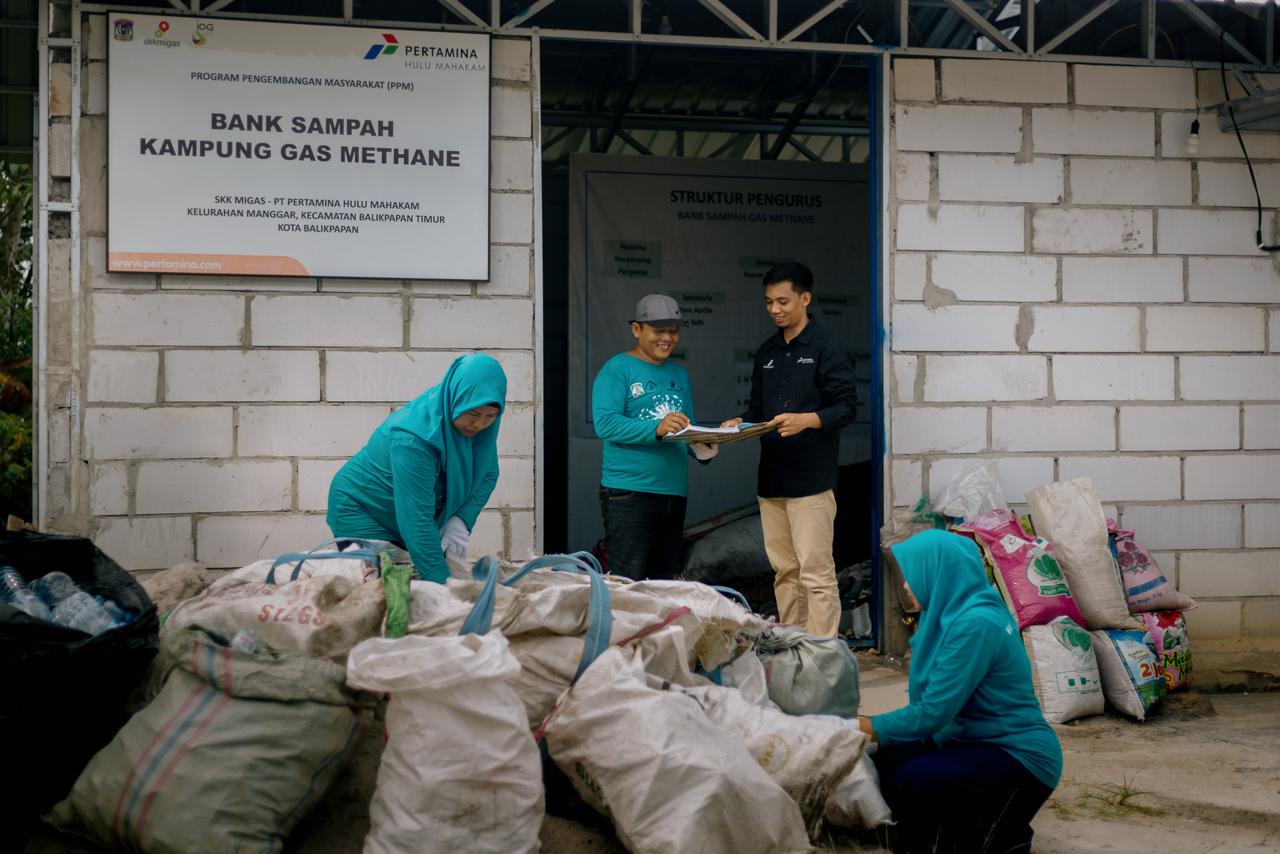01
Mar

Balikpapan - PT Pertamina Hulu Mahakam (PHM) has successfully promoted the use of Renewable Energy Sources (EBT) by the community, namely methane gas derived from organic waste processing through its flagship environmental CSR program, the Waste to Energy for Community (Wasteco) Program implemented at the Manggar Waste Processing Site (TPAS), Balikpapan City, East Kalimantan Province.
The Wasteco Program has proven to provide economic benefits to approximately 1,250 community residents in the Manggar TPAS area and positive environmental impacts, where the community can benefit from waste management to obtain alternative energy sources used in their daily activities and support their businesses. The existence of the Wasteco Program has now encouraged the growth of 28 local MSMEs.
During a visit and discussion with program beneficiaries some time ago, Handri Ramdhani, Senior Manager Relations of PT Pertamina Hulu Indonesia (PHI), explained that the Wasteco Program, a collaboration between PHM and the Balikpapan City Environment Agency (DLH), also supports the availability of more affordable, reliable, and sustainable energy access for the community from an environmental perspective.
According to him, this program's success deserves to be an inspiring story for commemorating National Waste Awareness Day on February 21, 2024.
"The estimated cost savings for cooking for families around the Manggar TPAS reached around Rp 420 million per year by reducing the total use of 3 kg LPG cylinders by 16,800 cylinders per year," he said.
Handri added that the reduction in LPG also means a reduction in the cost of importing LPG, which uses foreign exchange. In its implementation, Handri explained that the Wasteco Program adopts six oil and gas exploration technologies to process methane gas. "This program has obtained Intellectual Property Rights and Patents from the Ministry of Law & Human Rights of the Republic of Indonesia," he added.
Norma, Chairwoman of the Blessed Methane Gas MSMEs, revealed that before the PHM Wasteco Program, residents used four to five 3 kg LPG cylinders per week. "Currently, after the Wasteco Program, we can save Rp 100,000 per week, and we can use methane gas for businesses with profits ranging from Rp 500,000 to Rp 1 million per month," she added.
Currently, the Wasteco Program has successfully utilized 820,000 cubic meters of methane gas annually, originating from around 164,000 tons of waste piled up at the Manggar TPAS Landfill. Nurlita, Secretary of the Methane Gas Management Group, hopes this program will be sustainable and continue to improve for the economic betterment of the community.
Mochamad Haryanto, Head of the Manggar TPAS Management Unit, Balikpapan City, said, "The waste volume in Balikpapan City averages 400 tons daily. If calculated, the waste at the Manggar TPAS Landfill has the potential to produce 1.5 million cubic meters of methane gas per year. This great potential must be managed and utilized for the benefit of the community," he emphasized.
Meanwhile, Dony Indrawan, Manager of Communications Relations & CID at PHI, explained that the Wasteco Program is one of the company's flagship environmental CSR programs, focusing on the company's commitment to supporting environment preservation, biodiversity conservation, emission reduction, energy efficiency, and waste processing.
"We intend to consolidate our diverse environmental CSR initiatives under a program named Kalimantan's Sustainable Earth Energy (ELBK), aiming to enhance our influence on society and the environment towards sustainable living," he clarified.
To ensure the sustainability of the program and its replication in other locations, Dony indicated that the Wasteco Program and the Manggar TPAS serve as educational venues for the successful utilization of EBT methane gas. "Now the Manggar TPAS has become an educational site for waste processing for students, university students, business people, and government agencies. Almost every day, there are visits from various schools and universities in Samarinda and Balikpapan, as well as from outside the city," said Dony. Not only that, but guests from abroad, including the governments of Japan, Germany, and South Korea, also visit to observe the Wasteco Program activities.
The Wasteco Program also contributes to Sustainable Development Goals (SDGs), especially Goal 7 on Clean and Affordable Energy and Goal 8 on Decent Work and Economic Growth. The Wasteco Program has also successfully reduced emissions by 296,356 tons of CO2eq per year, which is the implementation of support for SDG Goal 13 on Climate Action.
PT Pertamina Hulu Mahakam (PHM) is a subsidiary of PT Pertamina Hulu Indonesia (PHI) that manages upstream oil and gas operations and businesses according to Environmental, Social, and Governance (ESG) principles in the Mahakam Working Area in East Kalimantan. Through collaboration with SKK Migas, PHM, along with other subsidiaries and affiliates of PHI, carries out innovative Corporate Social Responsibility programs in various fields to support sustainable community empowerment and the achievement of Sustainable Development Goals (SDGs). PHI's headquarters is in Jakarta. Further information about PHI is available at https://phi.pertamina.com.